What I like and dislike in Adventure games
I’m currently playing and replaying a lot of adventure games, in order to dissect their individual parts and really understand what I like and dislike about them. I do like to play games for their story even more for their gameplay, but storytelling doesn’t just naturally happen. I’ve played dozens and dozens of adventures, but the ones I focused on most are Monkey Island, Le Chuck’s Revenge and Tales, Zak McKracken, Maniac Mansion and Day of the Tentacle, Indiana Jones Last Crusade and Fate of Atlantis, Grim Fandango, Secret Files: Tunguska, Lost Horizon, Syberia, Fahrenheit/Indigo Prophecy, Gabriel Knight: Sins of the Fathers, Heavy Rain, To the Moon, The Walking Dead and Gemini Rue, with another dozen or so that I haven’t deep dived into yet and not to mention the old Infocom and Sierra text classics like Zork, Police Quest and Leisure Suit Larry.
Like: Exotic Locations
I was never a fan of “Haunted House” style settings (e.g., Phantasmagoria or Mystery House), instead I love gorgeous scenery. Waterfalls, Jungles, Ice Caves. Lost Horizon has to get a prize for its scenery, every location is beyond beautiful. Monkey Island 2 had a few gorgeous jungle locations as well, not to mention Woodtick. Syberia wasn’t my favorite game graphics wise, but the train station in the greenhouse is neat. I bought To The Moon solely based on its screenshot, specifically the one with the rocket.
Zak McKracken had the Sphinx, which was even more amazing than the Mars in my opinion. Same for the Aztec temple in Mexico.

Dislike: Frequent Disruptions for non-story related things
Adventure games life from their dialogues and cutscenes, but they are usually at the end of a longer gameplay session. Also, initiating a dialogue usually shifts the game into a different “mode”, making it clear you can’t interact with the normal gameplay elements. Games that make it appear like I can play but I actually can’t or that are interrupting gameplay every few seconds are frustrating beyond belief. That killed To The Moon for me, because in the moment you go upstairs to the dying man at the very beginning, you are put in this really awkward situation where you can’t really play because you are interrupted all. the time.
In a similar vein, tutorial prompts are usually not needed. Modal dialogs are evil, if you need to introduce a gameplay element, introduce it in form of a puzzle and guide me towards the right way to handle the element you want to introduce. Don’t explain what you can show.
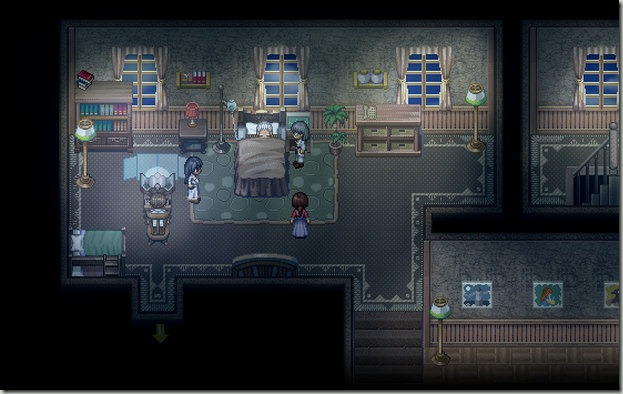
Like: Noir Atmosphere, Sinister situations, constant feeling something is going wrong
This one is obviously personal, but I love the noir setting in many games, because it adds a constant source of urgency and paranoia. You do something that brings you forward in the game, but once you leave the room, the bad guy appears and does something. Gemini Rue used that in a few places to great effect, Discworld Noir and Grim Fandango had shown that you can mix humor into it. Victor Loomes was an advertising game for a German bank but had a denser atmosphere than a lot of commercial games. Gabriel Knight is also to mention here.
And then, there is one of my favorite moments, in gaming: Kerner appearing behind the boxes in Indiana Jones and the Fate of Atlantis. This was unexpected and was really well timed.
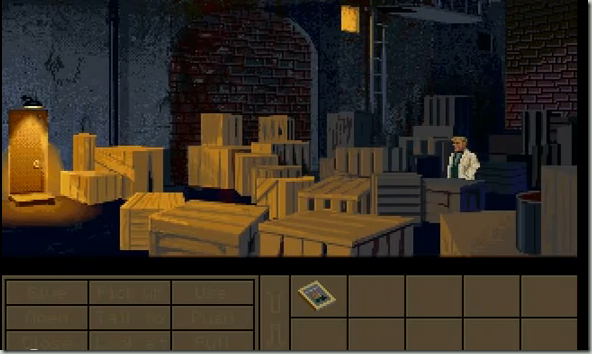
Dislike: Illogical, stupid puzzles
Adventures are known for convoluted, illogical puzzle solutions. Arguably, Gabriel Knight 3’s infamous “Put tape on hole in fence, chase cat through hole, get cat hair from tape to make fake mustache” puzzle stands out (If you haven’t read Death of Adventure Games, do so now!), and then there is Secret Files: Tunguska. To quote Gamespot:
She feeds a stray cat salted pizza and then tapes her cell phone to it in a roundabout way of eavesdropping on a conversation.
Now, the problem with puzzles is that if they are strictly logical, they are trivial. There is a key in an aquarium and I can’t get it out because there is some grating at the top and my fingers don’t go through. The correct solution in the game is to get a magnet and basically fish the key out. In real life, I would possibly retort to brute force and just smash the aquarium if all else fails (sorry fishies!). But even if I end up combining items, the logical solution often makes things trivial.
This genre needs suspension of disbelief more than some others, but that doesn’t mean that all puzzles need to be nonsensical. I think the spit contest puzzle in Monkey Island 2 was great because it did make sense. At the same time, the “If this is 4, what is this?” hand puzzle is one of my least favorite ones, although it could better be described like this guy did:
It's a halfway brilliant puzzle just because of the misdirection - after you figure it out, you either want to choke the designer for being so irritating or slap yourself for being so stupid.
Overall, the game should just flow well, solutions should be evident by thinking about it and possibly revisiting a few places, I shouldn’t find myself in a situation where I’m combining every item in my inventory with every other because I’m stuck. (That’s not to say that inventory-combining is bad, quite the opposite).
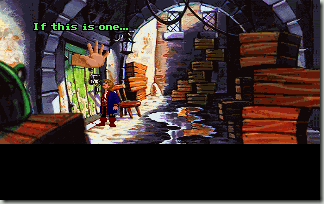
Like: Few, but meaningful Characters
Is Balder or Epsilon Five trustworthy in Gemini Rue? What about Dr. Elsa Schneider in Indiana Jones and the Last Crusade? What are Melissa and Leslie up to on Mars in Zak McKracken? And what is Olivia up to in Grim Fandango?
Adventures tend to have large sceneries, but only very few main characters. Pretty much all of the Adventures that give you a sidekick are doing really well, giving you a meaningful, deep and interesting character. Sure, Sophia Hapgood may not work on her own without Indiana Jones, but her dialogue is well built out and she doesn’t just feel like that annoying secondary character you have to control every once in a while (unlike e.g., Shelly Birkin in Resident Evil 2).
Betrayal and distrust can be very strong story drivers even in humorous games, because regardless if a character betrays you or not, you constantly question your decisions.
But even the characters that you can trust need to stand out. Wally in Monkey Island 2 is a relatively undeveloped character but is still remembered because he was one of few. The pirates are pure fluff (apart from the rat puzzle), but we remember them. Glottis stands out in Grim Fandango, and the reason The Walking Dead just won a Game of the Year award can be summarized in one word: Clementine.
Heavy Rain and Gemini Rue use alternating storytelling to switch between several main characters throughout the game, a feat that’s hard to get right and yet they succeeded.
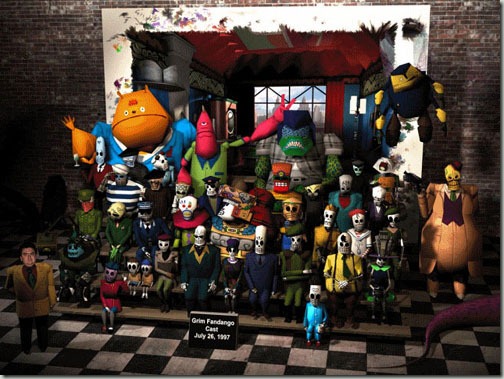
Dislike: Mazes
Zak McKracken is an offender here, stretching the gameplay through mazes. Regardless if you’re in the jungle, on mars or inside the sphinx, there are mazes. I can understand a single maze making sense as part of a puzzle (e.g., following the shop keeper in Monkey Island 1).
Sorry, I don’t think that I should need to map a place or find some obscure hint through the maze more than once, if I want mazes then I play some dungeon crawler/roguelike game.
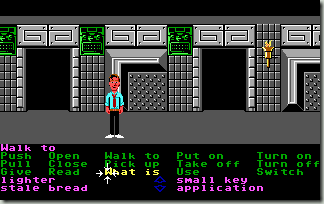
Like: Multiple-Choice Dialogues and multiple solutions to problems
Few adventures offer actual choice with different outcomes, but multiple choice dialogues offer a great way to give the illusion. Also as Ron Gilbert said perfectly:
The other thing that’s nice is when those dialogue choices come up on the screen—there were four choices—you only got to choose one of them, but you got to read all four. That was a great source of humor because I could tell four jokes at once.
That being said, actual choice is also nice if done well. Indiana Jones could talk his way out of fistfights by the right choice of dialogue or through a puzzle that involved a lot of beer and a very big enemy. Gemini Rue gives you the option to walk around an enemy or fight them (arguably, that’s the only choice in the game), Fate of Atlantis has three different ways throughout the game (Action, Puzzles, Team with Sophia). Adventures don’t usually have as many branches and outcomes as RPGs (Bioware is a great example of branches in KOTOR, Mass Effect Dragon Age), but there are notable exceptions: Fahrenheit and Heavy Rain feature a lot of meaningful decisions that result in alternate dialogues and endings.
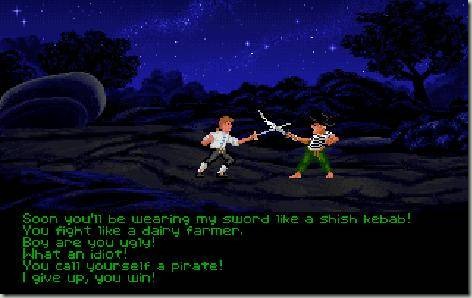
Dislike: Multiple characters at the same time
I like linearity to an extent. Open World is nice, as long as I don’t feel like I’m missing something. Giving me control over multiple characters at the same time always makes me question if I’m playing the right character right now. Gemini Rue gives you control over either Azriel or Delta-Six and even though it really doesn’t matter in which order you play them, you don’t know that at the time. I constantly wondered if I needed to advance with the other character in order to solve a problem with the other one (you don’t).
Zak McKracken had a similar switching between characters, although it worked a bit better since they were all part of the same narration, but it was at times really confusing to figure out whether I should continue to do stuff on Earth or on Mars.
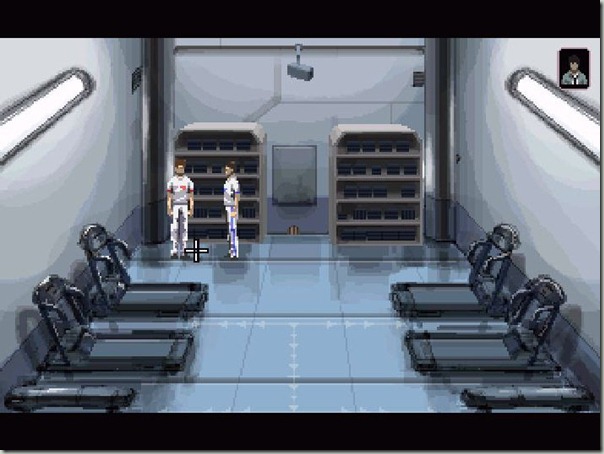
Like: No Fail
As said, I play games for their story. I don’t mind challenges and timed puzzles, but I dislike dying and returning from some savegame a long time ago or even restarting the game.
Both Maniac Mansion and Zak McKracken could become unwinnable, and you may not immediately recognize it and screw up your savegame for good. Luckily, the vast majority of Adventures can’t become unwinnable. Gemini Rue for example autosaves before every possible death trap and if you lose, you get right back to the scene without having to constantly replay parts.
Monkey Island even made fun of this with the rubber tree joke when you jump off the cliff. Adventure games are interactive storytelling/puzzle games, not action games which like to send you through the same easy part over and over again just because you can’t beat the boss at the end.
Interesting in this aspect is Heavy Rain: Even when you “lose”, you still advance the plot and will eventually come to an ending. Indiana Jones and The Last Crusade is somewhere in-between because you can die, but you get an ending scene (instead of just staying in the game with no indication that you can no longer finish it).
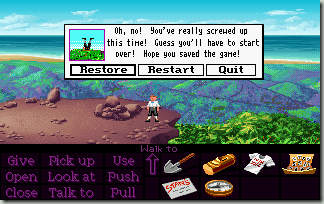
Dislike: Too many fundamental open questions at the ending
I’m not a fan of “The ending is intentionally ambiguous, everyone can interpret it like they want”. I do understand that the Monkey Island 2 ending is so well known because it was so absurd, but frankly, it wasn’t good.
Gemini Rue was an amazing game right to the very last scene, I really thought the ending wasn’t worthy of the game. Two examples in other genres are Braid and possibly the most infamous example of a bad ending, Mass Effect 3, an amazing game in an amazing series, completely and utterly ruined by possibly the worst ending in the history of video games.
During the game, I develop a relationship with the characters, sympathize with their cause, suffer their pains and enjoy their joys. I’m immersing myself into their world and I want to see an ending in which stuff comes together and that makes me go away from the game with a good feeling (even with the dark endings in Heavy Rain). Don’t screw that part up, since a bad ending can undo an otherwise stellar game.
I also feel that this is the section to address a problem that’s specific to one developer: Episodic content. Now, I don’t mean to pick on Telltale Games because I own almost all of their games and can highly recommend buying them. But because each of the five episodes in a season need an ending, the storyline is often shallow and rushed. Tales of Monkey Island was a good game overall, and Morgan LeFlay is a great character. The Ending of Episode 5 is magnificent, it’s dark and yet it’s Monkey Island for sure. But Episode 2 and 3 are shallow and feel pointless because the narration isn’t strong enough and they are just too small to really create the narration that is needed. Back To The Future has a similar problem where the end of Episode 5 is stellar, yet previous episodes lack cohesion.
It seems that they got their storytelling tighter in The Walking Dead, but I still think that the need to have 5 different endings is detrimental to the strength of the overall storytelling.
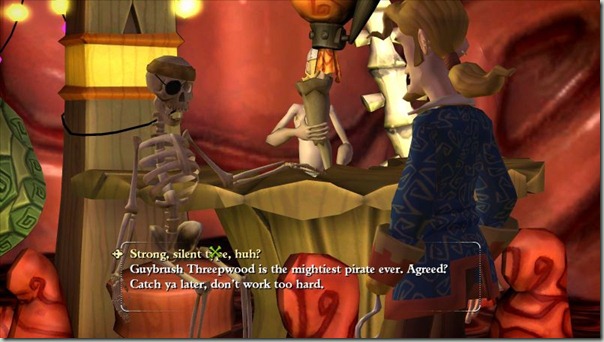
Like: Music and Ambient sounds
Music makes or breaks the atmosphere. Especially in the older games where technology doesn’t allow us to really show everything we want to show, music provides the perfect way to transport emotions.
I was lucky to grow up with a Commodore 64 and its legendary SID Soundchip. Maniac Mansion and Zak McKracken have legendary intros because of their respective music. Gemini Rue has a great ambient sound, with machines humming and rain... well, raining. Especially for modern Indie-Retro-Games, Chiptune- and Synth soundtracks work extremely well.
Inherit the Earth is possibly the Adventure with the best overall music of any adventure I’ve ever played, it’s just so perfect in how it creates the atmosphere of solitude and mystery.
Dislike: Third-grade voice acting
Voice acting is a blessing and a curse. I remember playing the first “Talkie” versions of Indiana Jones and the Fate of Atlantis and Flight of the Amazon Queen and these games couldn’t be more different.
Indy has first grade voice acting, while FotAQ is just painful to listen to. It seems that female voices are especially problematic, because they often range from “obviously fake” to “pitched so high I want to stick a fork into my ears to make it stop”.
I do want to give an honorable mention to the German version of Inherit the Earth, called Erben der Erde. I don’t think I will ever forget the first words – “Um uns sind der Himmel, das Land und die Seen, und wir fragen uns: Sind wir die Einzigen?”. Goosebumps. (I really dislike the English version)
I think that voice acting is a must for every adventure these days, and it must be good voice acting.
Like: Journal feature
Often, I play a game for a while and then don’t touch it for weeks and months. And then I rarely finish the game because when I want to resume playing, I completely forgot where I was, who the people were and all these little clues that are important later.
Secret Files: Tunguska has a journal which captures the most important plot details and clues, so I can easily refresh my memory without having to go to GameFaqs in order to find a Walkthrough.
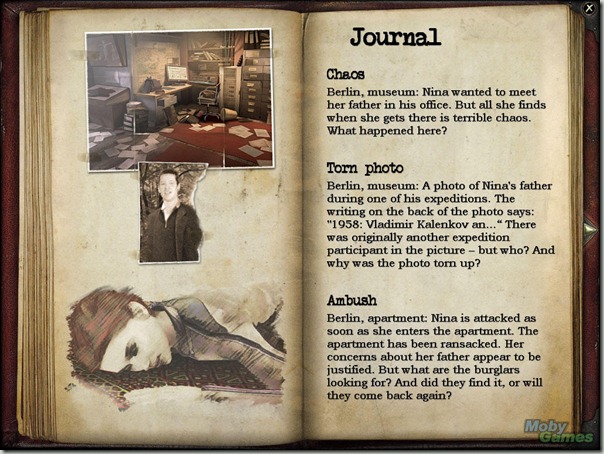
Dislike: Unclear User Interface / Meaningless Items instead of clear text
The old Lucasfilm Games adventures had a text-based verb and inventory bar at the bottom, spelling out in clear English what you are doing. Later games replaced the inventory with icons (Monkey Island 2 and Indy 4 were the first ones as far as I remember) which mostly worked well, but already introduced a few minor usability issues when the icon didn’t exactly match the expected item or when a pun that was useful in a puzzle was lost.
In an attempt to make games more cinematic, Full Throttle and The Dig completely got rid of the permanent UI and introduced context-sensitive actions, which has since become the standard. The remakes of Monkey Island 1 and 2 use icons instead of textual verbs as well now at least on iOS.
The problem is that these icons are often hard to decipher, for example “Give” vs “Pick Up” (both are a hand with an arrow, but the hand is dominating, so I always need to look twice). Some games combined these actions or tried some alternate approaches (e.g., Gemini Rue uses Eye, Hand, Mouth and Foot icons, but Hand is a more generic “Use” verb) and ultimately overload the mouse button with multiple functions.
Secret Files: Tunguska does it mostly right: Left Button is Walk and Interact, Right Button is Look and Cancel. The Inventory is permanently displayed at the bottom, making it easy to combine items and focus on playing the game.
I also have to call out Loom here. The game was very imaginative for sure and I think it’s sad the story was never completed, but I didn’t like the control scheme at all.
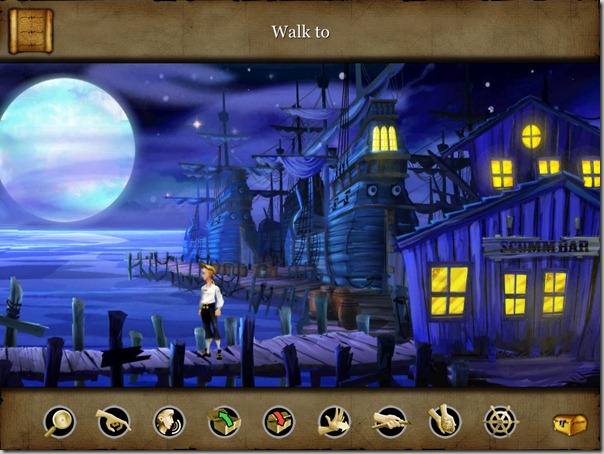
[...] you might have gathered from my previous posting about Adventure Games, I’ve spent a lot of time recently playing these games and while there are many different details [...]